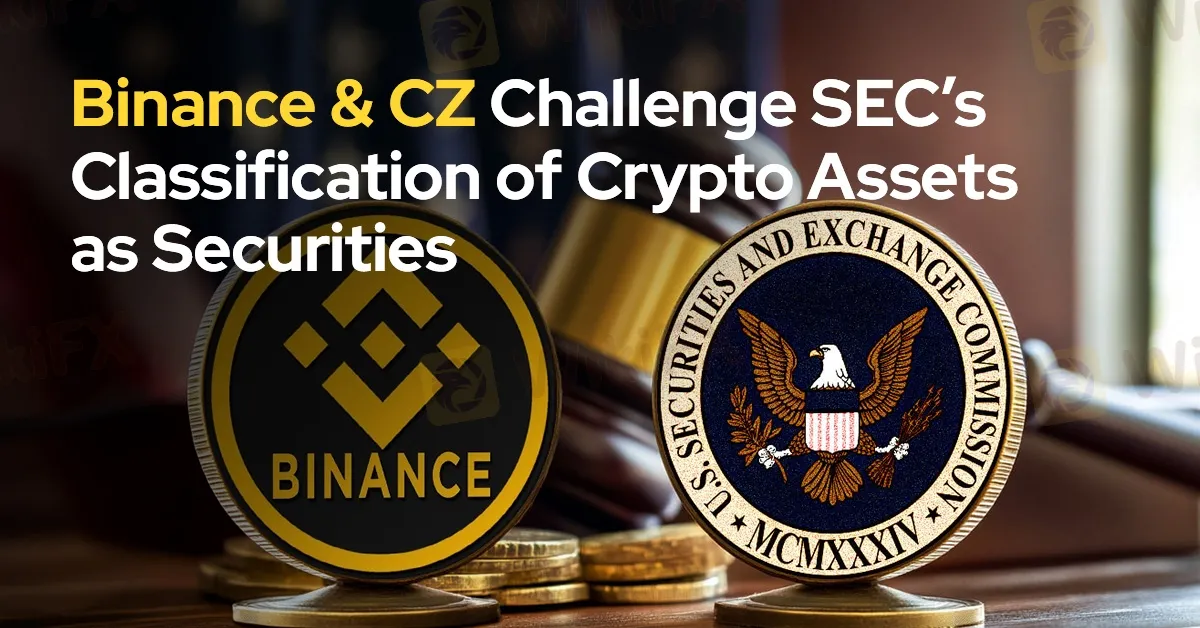简体中文
繁體中文
English
Pусский
日本語
ภาษาไทย
Tiếng Việt
Bahasa Indonesia
Español
हिन्दी
Filippiiniläinen
Français
Deutsch
Português
Türkçe
한국어
العربية
Binance & CZ Challenge SEC’s Classification of Crypto Assets as Securities
Abstract:In a November 4 filing, legal representatives for Binance and its CEO Changpeng Zhao (CZ) contested the Securities and Exchange Commission’s (SEC) amended complaint, asserting that the SEC merely pays “lip service” to a court ruling that excludes crypto assets from the definition of securities. The lawyers argue that despite this ruling, the SEC has continued to disregard its implications on digital asset trading

In a November 4 filing, legal representatives for Binance and its CEO Changpeng Zhao (CZ) contested the Securities and Exchange Commissions (SEC) amended complaint, asserting that the SEC merely pays “lip service” to a court ruling that excludes crypto assets from the definition of securities. The lawyers argue that despite this ruling, the SEC has continued to disregard its implications on digital asset trading.
The court previously determined that cryptocurrencies do not qualify as securities, implying that secondary market resales of these assets should not be classified as securities transactions. However, Binance‘s legal team contends that the SEC’s amended complaint persists in labelling nearly all crypto transactions—including secondary market resales of tokens—as securities transactions. This stance is based on the premise that some investors might anticipate an increase in asset value.
Furthermore, the filing highlights that the SECs amended complaint fails to provide a clear legal distinction between assets and investment contracts. The lawyers argue that assets should not be deemed investment contracts merely because they are presented to customers within a framework of promises and expectations. They emphasize that the SEC has not established definitive standards to guide courts, litigants, or market participants in determining which digital asset transactions qualify as investment contracts.
Binances attorneys also criticize the SEC for what they describe as arbitrary decision-making, referencing a recently abandoned case where Ether transactions were initially classified as investment contracts. The legal team points out that the SEC has acknowledged its own inability to differentiate securities from non-securities like Beanie Babies at the pleading stage.

The document further elaborates on the arguments against the SEC‘s cases involving Binance and CZ, ultimately requesting the dismissal of the SEC’s claims without allowing for any amendments. This follows an amended complaint filed by the SEC in September, where the agency clarified that it did not intend to label cryptocurrencies and tokens as securities outright. The SEC admitted to using the term “securities” as a broad reference to various aspects of crypto sales and later committed to using the term “crypto asset securities,” apologizing for any resulting confusion.
The legal battle dates back to June 5, 2023, when the SEC filed a lawsuit against Binance, CZ, and several affiliated companies for allegedly violating securities trading regulations. The SEC based its allegations on a court document that recognized Binances BNB token and the BUSD stablecoin as securities. Binance is not alone in facing such legal challenges; the SEC has also filed lawsuits against other major crypto entities like Coinbase and Ripple, accusing them of offering unregistered crypto asset securities.
As the dispute continues, the outcome of Binance and CZs legal efforts could have significant implications for the broader cryptocurrency market and the regulatory framework governing digital assets.

Disclaimer:
The views in this article only represent the author's personal views, and do not constitute investment advice on this platform. This platform does not guarantee the accuracy, completeness and timeliness of the information in the article, and will not be liable for any loss caused by the use of or reliance on the information in the article.
Read more

Crypto Influencer's Body Found Months After Kidnapping
The body of missing crypto influencer Kevin Mirshahi, abducted in June, was found in Montreal. A woman has been charged in connection with his murder.

Bitfinex Hacker Ilya Lichtenstein Sentenced to 5 Years in Prison
Bitfinex hacker Ilya Lichtenstein was sentenced to 5 years for stealing 120K Bitcoins as the cryptocurrency soars past $93K amid bullish market trends.

UK Sets Stage for Stablecoin Regulation and Staking Exemption
The United Kingdom is advancing its approach to cryptocurrency regulation with a specific focus on stablecoins and the potential exemption of staking services. British authorities are preparing new legislative measures to be implemented by December, aiming to bolster the nation’s appeal as a hub for digital asset innovation.

PayPal Expands PYUSD Transfers to Ethereum and Solana
PayPal's PYUSD stablecoin can now transfer across Ethereum and Solana, enhancing flexibility for users through a LayerZero cross-chain integration.
WikiFX Broker
Latest News
CySEC Warns Against Unauthorized Investment Firms in Cyprus
Why Even the Highly Educated Fall Victim to Investment Scams?
Warning Against Globalmarketsbull & Cryptclubmarket
Dukascopy Bank Expands Trading Account Base Currencies
UK Sets Stage for Stablecoin Regulation and Staking Exemption
Axi Bids AUD 52M to Acquire Low-Cost Broker SelfWealth, Outbidding Competitor Bell Financial
Crypto Influencer's Body Found Months After Kidnapping
STARTRADER Issues Alerts on Fake Sites and Unauthorized Apps
Italy’s CONSOB Blocks Seven Unregistered Financial Websites
Bitfinex Hacker Ilya Lichtenstein Sentenced to 5 Years in Prison
Currency Calculator


